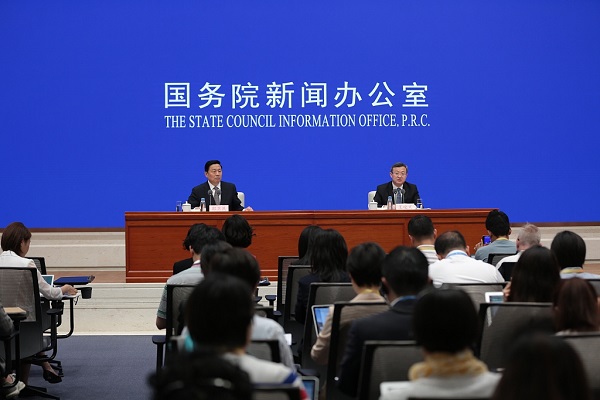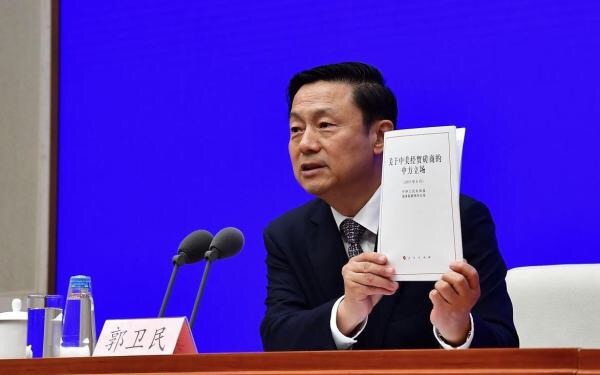
The State Council Information Office holds a press conference on the white paper on China’s position over China-US trade talks. (Screenshot: People’s Daily app)
The State Council Information Office (SCIO) on Sunday issued a white paper to provide a comprehensive picture of the China-US economic and trade consultations, and present China's policy position on these consultations.
The white paper, titled "China's Position on the China-US Economic and Trade Consultations," devotes three sections to elaborate on the damages of the trade frictions provoked by the United States, the US backtracking on its commitment in the consultations, and China's commitment to credible consultations based on equality and mutual benefit.

Guo Weimin, Vice Minister of the State Council Information Office
Since it took office, the new US administration has used trade deficit and intellectual property as excuses to frequently provoke economic and trade frictions and unilaterally imposed additional tariffs against China, forcing China to take strong measures to defend its interests, Chinese vice commerce minister Wang Shouwen said at a press conference in Beijing Sunday.
The US moves have put the interests of both countries and the wider world at risks and ignored the win-win nature of China-US economic and trade cooperation, he said.
Wang denied US accusations that China backtracked on its position in trade talks. "Nothing is agreed until everything is agreed," he added.
Wang called on the US to meet China half way, uphold the spirit of mutual respect, equality and mutual benefit, and jointly promote the stable and healthy development of bilateral economic and trade relations.
· China does not want but is not afraid of a trade war
The China-US commercial relationship serves as both the ballast and the propeller of the overall bilateral relationship. At stake are the fundamental interests of the two peoples, and the prosperity and stability of the world.
Concerning their differences and frictions on the economic and trade front, China is willing to work together with the US to find solutions, and to reach a mutually beneficial and win-win agreement. However, cooperation has to be based on principles. There are bottom lines in consultations. China will not compromise on major issues of principle. China does not want a trade war, but it is not afraid of one and it will fight one if necessary. China's position on this has never changed.
· US-imposed tariff measures harm others and are of no benefit to itself
The US administration has imposed additional tariffs on Chinese goods exported to the US, impeding two-way trade and investment cooperation and undermining market confidence and economic stability in the two countries and globally.
· US-provoked trade friction perils entire world
The China-US economic and trade friction provoked by the United States damages the interests of both countries and of the wider world.
The two economies are bound in a union that is mutually beneficial and win-win in nature. Equating a trade deficit to being taken advantage of is an error. The restrictive measures the US has imposed on China are not good for China or the US, and still worse for the rest of the world.
· US accusation of China IP theft, forced technology transfer unfounded
Accusing China of stealing intellectual property to support its own development is an unfounded fabrication.
China encourages and respects voluntary technical cooperation between Chinese and foreign firms based on market principles. It strongly opposes forced technology transfer and takes resolute action against intellectual property infringement. Accusations against China of forced technology transfer are baseless and untenable.
· China-US trade, investment are mutually beneficial
China and the US are each other's largest trading partner and important source of investment, and their commercial cooperation has brought substantial benefits to both countries and both peoples.
· US trade bullying harms the world
Economic globalization is a firmly-established trend of the times, and beggar-thy-neighbor unilateralism and protectionism are unpopular.
It is foreseeable that the latest US tariff hikes on China, far from resolving issues, will only make things worse for all sides. China stands firm in opposition. Recently, the US administration imposed "long-arm jurisdiction" and sanctions against Huawei and other Chinese companies on the fabricated basis of national security, to which China is also firmly opposed.
· US backtracks on commitments in China-US trade consultations
Since they were launched in February 2018, the economic and trade consultations have come a long way with China and the US agreeing on most parts of the deal. But the consultations have not been free of setbacks, each of them being the result of a US breach of consensus and commitments, and backtracking.
· US government bears responsibility for setback in trade consultations with China
The US government's accusation of Chinese backtracking is totally groundless. It is common practice for both sides to make new proposals for adjustments to the text and language in ongoing consultations. In the previous more than ten rounds of negotiations, the US administration kept changing its demands.
· China committed to credible consultations based on equality, mutual benefit
The Chinese government rejects the idea that threats of a trade war and continuous tariff hikes can ever help resolve trade and economic issues.
Guided by a spirit of mutual respect, equality and mutual benefit, the two countries should push forward consultations based on good faith and credibility in a bid to address issues, narrow differences, expand common interests, and jointly safeguard global economic stability and development.
· China will not give ground on issues of principle
During consultations, a country's sovereignty and dignity must be respected, and any agreement reached by the two sides must be based on equality and mutual benefit.
China has been consistent and clear on its position, that it hopes to resolve issues through dialogue rather than tariff measures. China will act rationally in the interests of the Chinese people, the American people, and all other peoples around the world.
· No challenge will hold back China's development
No challenge will hold back China's development, though its development may not be all smooth sailing, and difficulties or even perils are inevitable.
A more open China will have more positive interactions with the world, which in turn will advance the development and prosperity of both China and the world.
· Cooperation is only correct choice for China and US
Cooperation is the only correct choice for China and the US and win-win is the only path to a better future.
It is hoped that the US can pull in the same direction with China and, in a spirit of mutual respect, equality and mutual benefit, manage economic and trade differences, strengthen trade and economic cooperation, and jointly advance China-US relations based on coordination, cooperation and stability for the well-being of both nations and the world.
(With input from Xinhua)


